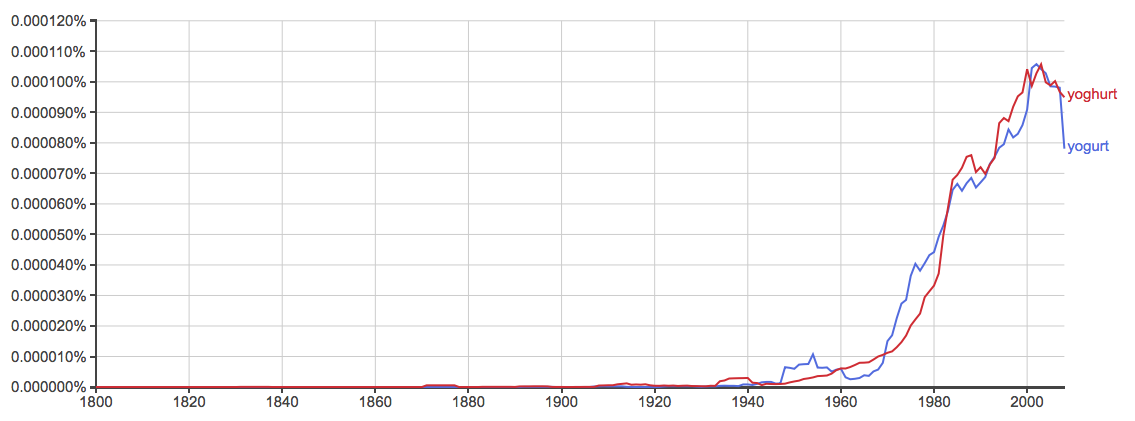Some people say that breakfast is the most important meal of the day. There are many healthful choices for breakfast foods.
Most of these choices don’t involve a spelling conundrum, but yogurt does. Should this dairy product be spelled with an H, to form yoghurt, or should the H be omitted? Like many such questions, this one can be traced to differences in spelling conventions between American and British English.
Thankfully, there are clearly defined situations when each spelling would be more appropriate. Read on to find out what they are.
Yogurt vs Yoghurt: What’s the Difference?
In this article, I will compare yogurt vs. yoghurt. I will demonstrate the use of each in a sentence before giving you a helpful tool to use when choosing yogurt or yoghurt.
When to Use Yogurt
 What does yogurt mean? Yogurt, a Turkish loanword, is spelled as such, with no “H.” This spelling is preferred in American English and throughout the English-speaking world.
What does yogurt mean? Yogurt, a Turkish loanword, is spelled as such, with no “H.” This spelling is preferred in American English and throughout the English-speaking world.
Yogurt, of course, is a noun that refers to a dairy food product that is usually eaten with breakfast or as a snack.
Here are some examples,
- Some people enjoy Greek yogurt, but others find it too sour.
- I like to eat yogurt for breakfast, but others eat it as a snack after lunch.
- Yogurt is an important ingredient in some smoothies.
- Our collective exposure to the way the rest of world eats yogurt also includes the way the world drinks yogurt. –Chicago Daily Herald
When to Use Yoghurt
 What does yoghurt mean? Yoghurt is a variant spelling of yogurt that is common in British English. It can be used in all the same contexts as its American counterpart yogurt.
What does yoghurt mean? Yoghurt is a variant spelling of yogurt that is common in British English. It can be used in all the same contexts as its American counterpart yogurt.
While yoghurt is much more common in British English than in American English, it still isn’t the dominant spelling.
In fact, the spellings yogurt and yoghurt roughly approximate each other in British English writing.
- Enfield EMS found themselves saving the life of a befuddled squirrel. They rescued a squirrel who had managed to get its head trapped in a yoghurt cup. –The Telegraph
Either spelling in acceptable in British English.
Trick to Remember the Difference
Here is a helpful trick to remember yoghurt vs. yogurt in your writing.
Yoghurt is common in British English, but seldom used in America. On the other hand, yogurt is common both in American and British English.
This graph looks at the usage of yogurt and yoghurt in the corpus of British English books written since 1800. As you can see, yoghurt and yogurt were both used throughout the 20th century, with yogurt being more common before roughly 1982, when the words’ positions reverse.

Since this chart focuses on books to the exclusion of other print sources, it is hardly exhaustive, but it still shows us that both yogurt and yoghurt are in widespread use in British English today.
In other words, yogurt will never be incorrect—no matter where you are. Yoghurt, however, should be avoided in American English.
To remember that yoghurt is the primarily British spelling of this word, think about the H that it shares with the word British. There is no H in the word American, and yoghurt should not be used in American English.
Summary
Is it yogurt or yoghurt? Yogurt and yoghurt are alternative spellings of the same word, which is a noun that refers to a dairy food.
- Yogurt is used everywhere.
- Yoghurt is only used in British English.
Notice the H shared between yoghurt and British—this letter will help you remember whether to use yoghurt or yogurt, depending on your intended audience.
Failing that, you always have the option to refer back to this article for a quick review.
Contents
